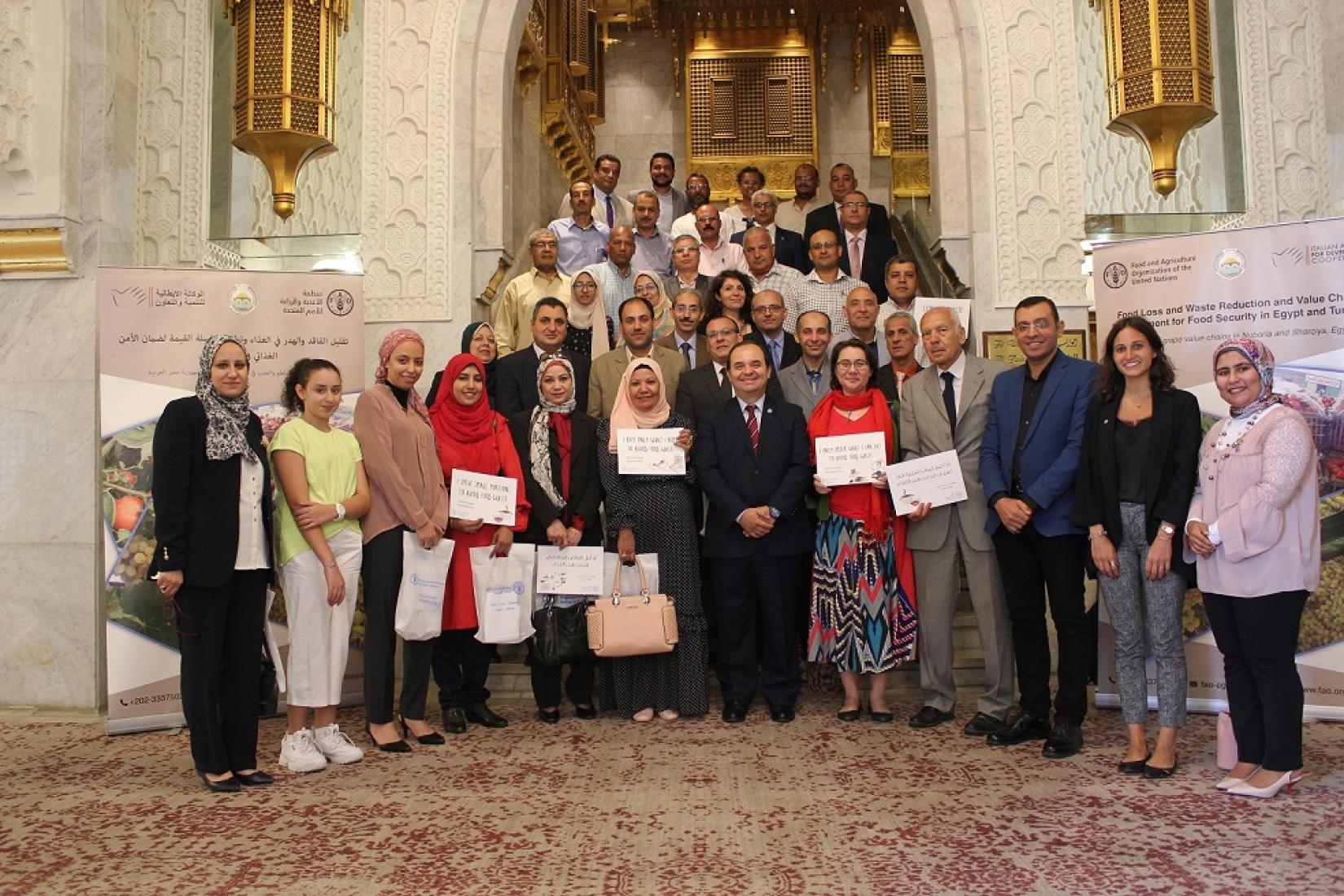FAO is closing the Food Loss and Waste Reduction project with a call for sustained efforts to eradicate hunger
30 July 2019
- Accoring to the FAO, the project has trained 7 895 farmers, farm labourers and traders, along with a number of female teachers, students, rural pioneers and housewives, on loss and waste reduction mechanisms during the post-harvest phase.

The Food and Agriculture Organization of the United Nations (FAO) in Egypt announced today that the project “Food loss and waste reduction and value chain development for food security in Egypt“, managed to train a number of 7 895 farmers, farm labourers and traders, along with a number of female teachers, students, rural pioneers and housewives, on loss and waste reduction mechanisms during the post-harvest phase.
This announcement came during the closing workshop of the project, which was financed by the Italian Agency for Development Cooperation and that started its implementation in October 2015 in collaboration with the Ministry of Agriculture and Land reclamation. Representatives from all the actors and beneficiaries of the project have participated in the workshop.
“The Ministry has assumed the responsibility of developing the Egyptian agriculture, which requires a climate of security and stability, in addition to people’s support to the developmental efforts via working with the private sector and civil society organizations. The country has adopted the process of reducing food waste which is being estimated at 50 kg per person per year, and most of this amount is lost in farms,” said Mr. Saad Moussa, in his opening speech on behalf of H.E. the Minister of Agriculture, Dr. Ezz El Din Abu Steit
“Moreover, this project’s objectives are in line with the objectives and strategies of the Ministry of Agriculture to reduce food loss and waste, which is ultimately reflected in increasing farmers’ incomes and increasing the technical and managerial capacities of the value chain members from small farmers to traders and manufacturers to maintain the quality and reduce losses in the value chain activities,” he added.
“More sustained efforts are needed to reduce food loss and waste, which will have significant impacts and consequences in the future, especially at the environmental level, where food waste is considered as a waste of the resources used in the process of production, such as land, water, energy and other resources,” said Mr. Mohamed Yacoub, Assistant FAO Representative.
“I hope that this closing workshop will mark a new and successful beginning towards united efforts and close collaboration with all stakeholders along the value chain in order to reduce food loss and waste in all its forms. This will eventually contribute to achieving food security and to eradicate hunger, one of the most important goals of SDGs for 2030,” he continued.
It is worth mentioning that more than 25 per cent of Egypt’s labor force is engaged in agriculture. The actions taken to reduce loss and waste in agricultural products, such as improved technologies, improved post-harvest trading, manufacturing processes, and better marketing channels, can lead to value chain development, increased income and the development of the agricultural sector.
The achievements of the project ” Food loss and waste reduction and value chain development for food security in Egypt” can be summarized in the following points:
- A number of studies carried out to assess the loss and waste along the value chain of grape and tomato crops – the targeted crops in Egypt;
- Capacities developed on how to reduce post-harvest crop losses;
- For the tomato crops: 4 513 farmers, farm labourers, and traders have been trained;
- For the grape crops: 2 157 beneficiaries have been trained;
- Establishment of a Sun-dried tomato processing unit and a grape and raisin processing unit;
- Food loss awareness raising campaigns targeting women and children were conducted in schools;
- 60 rural women leaders have been trained in Sharqia governorate in collaboration with the National Council for Women, a follow-up is expected to reach more than 720 housewives;
- 12 teachers and 340 students from 3 schools in Sharqia received the same training;
- Launched an awareness campaign through social media to reduce food waste in cooperation with the Egyptian Food Bank;
- Through the project, a ministerial decision was issued to establish a Food Loss and Waste Monitoring and Evaluation Unit in cooperation with the Ministry of Agriculture. This unit started working in April 2019.
“Recent statistics indicate that the losses resulting from food loss and waste along value chains in the Near East and North Africa region are estimated at more than US$60 billion per year, and that the losses per capita quota is 250 kg per year. In Egypt, the amount of food loss and waste ranges between 15-45 per cent depending on the crop type which underlines the importance of having implemented this project, aiming at providing solutions to prevent or reduce food waste, “ said Mr. Ismail El Faramwy, Agriculture Consultant at the Italian Agency for Development Cooperation.
The project of “Food Loss and Waste Reduction and Value Chain Development for Food Security in Egypt and Tunisia” was implemented by FAO in collaboration with the Ministry of Agriculture and Land Reclamation, and funded by the Italian Agency for Development Cooperation. It took a value chain approach to reduce food waste and loss in order to improve the economic and environmental efficiency of agricultural food sectors through improved food value chains. In Egypt, the project has been working with the tomatoes and grapes value chains in Nubaria and tomatoes in Sharqia. It successfully provided technical, infrastructural and marketing support to farmers’ associations and stakeholders in these target value chains.



